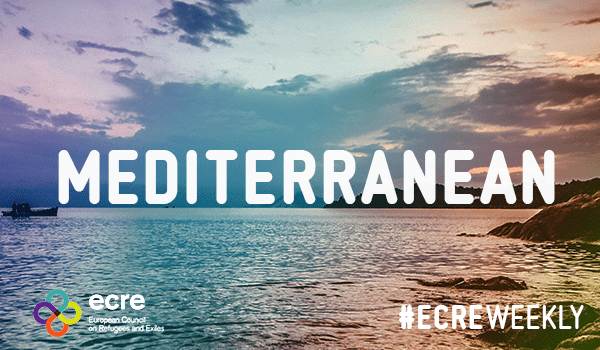Around 370 people from seven rescues carried out by Médecins sans frontières (MSF) were disembarked on 27 October in Palermo. After ten boat landings took place in 24 hours, Italian media claim Calabria is the “new Lampedusa”. The pope has denounced returns of people to “true concentration camps” in Libya, saying European countries need to guarantee search and rescue as well as access to asylum procedures. More than three weeks of refugee protests in Libya continue, despite a first evacuation flight to the Gambia.
Over the weekend of 22 to 24 October, the MSF ship Geo Barents carried out five rescues, saving 296 lives at sea. According to the aid group, one operation involved 95 people who “were about to be intercepted by the Libyan Coast Guard. [MSF] intervened before these people were forced to return to violence, abuse and exploitation in Libya”. Rescuers urged for the rapid disembarkation for the 296 on the rescue ship after six tested positive for Covid-19, fearing the virus would spread in the cramped conditions onboard. After additional rescues, 367 people were waiting onboard the ship, among them 172 minors. After several days of waiting to be assigned a port, the survivors were disembarked on 27 October in Sicily. Though all tested negative for Covid-19 upon arrival, 239 were transferred to a quarantine ship.
Italian media have reported that 7,000 people have arrived by sea to the town of Roccella Ionica and its neighbouring municipalities in the last year, more than three times the number that arrived via Calabria in 2020. 11 landings took place in October, amounting to 1,254 arrivals, including 780 people that arrived on 23 October. Reports of Calabria “swiftly becoming a new hotspot for illegal migration” however often hinge upon distorted comparisons to 2020, a year in which the global pandemic reduced journeys across all migratory routes to a minimum. In 2020, asylum requests in Italy dropped by 39%, and Italy granted 40% fewer residence permits to non-EU citizens than the previous year. Media also suggested however that a rise in journeys from Turkey and Egypt to Calabria – rather than from Libya to Lampedusa – may be related to people seeking to avoid horrendous conditions in Libya and the risk of being intercepted at sea and returned to the country.
Pope Francis has drawn attention to the suffering of the “men, women and children” returned to Libya. There, he said, they are subject to “inhumane violence” in detention centres that are “true concentration camps”. Addressing European populations and politicians, the Catholic leader said: “we need to stop sending [people] back to unsafe countries and to give priority to the saving of human lives at sea with protocols of rescue and predictable disembarking, to guarantee them dignified conditions of life, alternatives to detention, regular paths of migration and access to asylum procedures”. Nonetheless, between 18 and 23 October 846 people were returned to Libya via “pull-back” operations of the so-called Libyan coast guard, a body that comprises both government staff and militia members. In an interview with Le Monde, the head of the UN Refugee Agency (UNHCR) in Libya, Jean-Paul Cavalieri, confirmed that “nearly all migrants disembarked in Libya by the coast guard end up in detention centres”. Charities conducting rescues at sea have published photos of the ill-treatment and torture people are subjected to in these detention centres.
Thousands of refugees and migrants trapped in Libya continue to call for evacuation to safe countries. Many have been camped out in front of the UNHCR Tripoli office for more than three weeks, and solidarity protests have been held in Italy, the UK, Canada and Sweden. On 28 October, a seventeen year old Eritrean boy was said to have been killed by a car outside the centre. A group of 127 Gambians were repatriated on 24 October, marking the return of evacuation flights after several months of hiatus. Many of those protesting however, insist upon evacuation to Europe or North America, as they say they cannot return home. Further, the flights will benefit only a very limited number of people. Prior to the latest evacuation flight, only 345 people had departed the country via UNHCR-organised flights this year, and only 811 left this way in 2020. According to Jean-Paul Cavalieri, nearly 1,200 refugees are awaiting evacuation, presumably those who have been identified as vulnerable by the agency. However, there are in total about 42,000 registered refugees and asylum seekers in the country, most of whom are seeking to leave.
For further information:
- ECRE, Med: 500 People Await Disembarkation, NGO Acquitted for Refusing Libya Return, Boat-Drivers Scapegoated in Italy, Tragedy off Tunisia and Empty Boats Raise Shipwreck Fears, October 2021
- ECRE, Med: More Deaths and Returns to Libya, EU Funding and Cooperation with Notorious Coast Guard as Situation in Libya Deteriorates, October 2021
Photo: ECRE
This article appeared in the ECRE Weekly Bulletin. You can subscribe to the Weekly Bulletin here.

